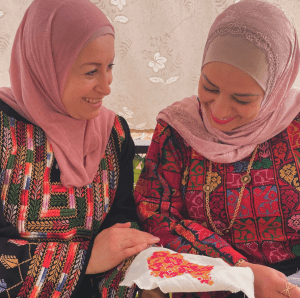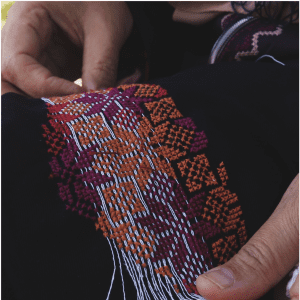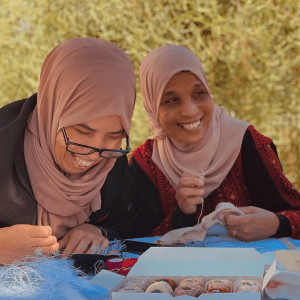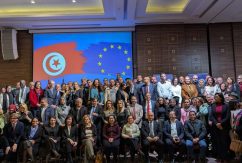Shoes that tell stories: the success of Jordan’s social enterprise GIOIA
Farah Aljouni could have written these lines a few years ago when she was reporting on Palestinian and Syrian refugees and underprivileged communities in Jordan. As a renowned journalist working for international media, Farah told stories of people in the midst of hardship and hope.
“While reporting from the refugee camps, I met many women who were extremely talented in the art of embroidery but did not know how to earn an income from this talent,” Farah recalls. Inspired by their lives and her own creative passion, she began to experiment and made shoes out of cereal boxes in her living room.
“When friends started buying these handmade shoes, it clicked in my head. I realised that I could help these women by combining their embroidery talent and innovative designs to create a product that was not on the market at the time.” She confides.

This “big moment”, as she calls it, was the birth of GIOIA. GIOIA is a social enterprise based in Jordan that is pioneering ethical fashion by integrating traditional embroidery into modern footwear. GIOIA is more than a brand and is described by its founder as “a journey of cultural celebration”. “
“It’s important to me that people understand that GIOIA is not just about the shoes. It’s about telling the stories of the artisans, talking about their heritage and culture,” Farah emphasises. She adds cheerfully: “I never really left journalism because the storytelling aspect is still very present. I don’t talk about the shoes, I talk about what those shoes stand for.”

Haute couture-like artisans: “Talent defines them, not their background”
GIOIA collaborates with artisans from Jordan, Palestine, and Syria, providing them with a platform to showcase their craftsmanship while earning a sustainable income. “You cannot imagine the extreme talents these individuals have. In another context, we would call them ‘artisans working for a haute couture atelier’ but, because they are refugees, this is how people tend to define them,” explains Farah, who insists on shifting the narrative.
She wants to step away from the “support to the underprivileged” lens. “I no longer want to refer to them as refugees or underprivileged; they are artisans. Their talent is what defines them, not their background.”
First, there is Helweh, a 65-year-old artisan from Palestine, who says working with GIOIA transformed her life. “I used to work in very harsh conditions at a garment factory, 6 days a week for less than $360 a month.”
“With GIOIA, the income now comes to my home; I can work from my house, and know that I will make enough money to provide for my daughters and myself.” For every pair of shoes sold, a portion of the proceeds goes directly to Helweh, ensuring she receives fair compensation for her work.
Then there is Layla*, who explains “when I joined GIOIA, I became able to support my daughter’s education. She is now the first in our family to graduate from university.”
For Farah, the flexibility of working from home is not a luxury, “it is crucial”. “Many of our artisans cannot leave their homes due to childcare responsibilities or lack of affordable transportation. By providing them with standardised tools and training, we ensure they can work efficiently and comfortably from their house, where they often take care of their families.”
Maher, Nour, Um Omar, all are voicing similar tales of a new, dignified income that became a gateway to their independence, allowing them to make their own decisions and support their families.

Toward ethical fashion: the role of the European Union
The journey towards establishing this smooth production model was not without challenges. “It took us a year to create a standardised toolkit for our artisans, ensuring consistent quality across different homes,” Farah recounts.
While the artisans, already skilled, needed minimal training to adapt to shoe production, aligning them to specific working hours, deadlines and standards was a new experience. Shoe production entails very tricky fine-tuning compared to the Small/Medium/Large clothes production.
Production lines also had to be adapted to ensure quality and consistency across all of GIOIA products. “Each artisan receives a detailed guideline book, standardised tools, and specific thread numbers for their designs,” Farah explains. “This ensures that even though the shoes are handmade by different artisans, the final products are uniform in quality and appearance.”
GIOIA’s production model is unique, as the company only does pre-orders to minimise waste and ensure each pair is customised to the buyer’s preference. This approach aligns with the enterprise’s commitment to ethical fashion. “We see ourselves as part of a larger movement towards ethical consumerism. When customers buy a product knowing it supports a cause -empowering women and preserving cultural heritage- we step a bit further from fast fashion and mass production.”
The support from the European Union has been instrumental in this regard. GIOIA received support from the CREACT4MED programme, which allowed the company to scale its operations by developing new business models and innovative approaches.
“With the EU’s financial and training help, we have been able to implement this pre-order model that minimises waste and allows for customisation,” Farah explains. “This model aligns with our sustainable goals, ensuring that we produce only what is needed.”
EU backing also set GIOIA on a path to increase the consistency of income for the artisans. “Currently, we work with them on a freelance basis, but we hope to provide a more stable source of income as we grow. This will give people like Helweh and Layla more security and allow us to expand our impact.”
GIOIA’s future is bright, with plans to expand to other regions such as Africa, Southeast Asia, and Latin America. “There are so many countries with rich cultures and talented artisans. It’s our duty to preserve these traditions,” Farah stresses, envisioning GIOIA as a “fashion-industry UNESCO social enterprise”, which helps preserve cultural heritage through fashion.





























 Syria
Syria 


